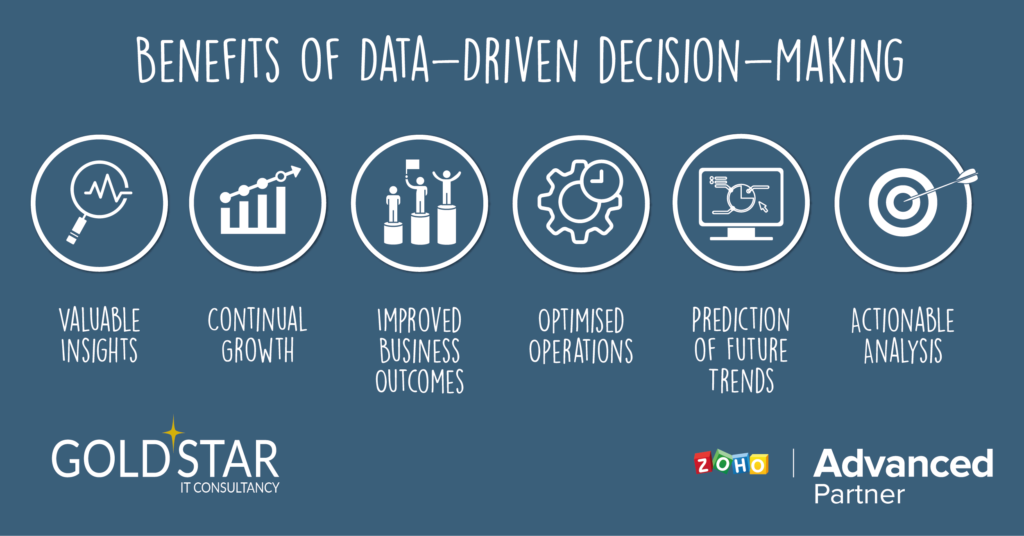Data-Driven Decision-Making, what you need to know
You might say a data-driven decision-making approach is the opposite of ‘instinct’. Instead of relying on feelings and anecdotal evidence it relies on the evidence taken from accurate numbers, detailed research, and infinite calculations of different ranges. While intuition, experience and market ‘feel’ can help you understand in which direction to go, it is data that you can rely on for the most valuable insights.

According to large scale PwC surveys, businesses that base their strategic decisions on data are 3 times more likely to achieve long-term success than those that don’t.
In this article, we’ll explain the basics of data-based decision making, the benefits it can provide, and how to successfully implement this approach into your business. In addition we will look at why data-driven analytics is so important today and will be even more so in the future.
What is Data-Driven Decision Making?
Data-driven decision making (DDDM), refers to the process of leveraging the power of data to organise the process of decision making in a business and validate the decisions made. It overlaps the world of data analytics, drawing usable information and insights from data collected from across the business and further afield. This information is then used to build reports and dashboards that are referenced to make more informed decisions.
On the way to being data-driven, businesses are pushing forward in three areas;
- Analytics agility
- Data proficiency
- Culture
These three areas contribute to a strong and effective data culture that improves a variety of internal decision-making cycles.
Why is Data-Driven Decision Making important in 2023 and beyond?
With technology available to give you real-time insights into your business, why wait until an annual, quarterly or even monthly report? When businesses act upon the insights gained from this information, they can make critical changes far more quickly than in the past. You can optimise your processes and other aspects of your business performance to respond to changes, trends and opportunities. Implementing data-driven analysis helps companies to reduce costs, increase ROI and optimise operations by highlighting more efficient ways of doing business.
Data analytics is not just for making better business decisions, it allows us to analyse customer behaviour, sales interactions, industry trends, and product/service performance, technology adoption and social trends – information which may lead to new and better products and services.
Why do we want to make better data-informed decision making?
- Increases confidence in various business decisions.
- Promotes collaboration and proactivity in decisions.
- More detailed control over different aspects of business performance.
- Encourages fact-based decisions over assumption-based ones.
- Evaluating and reducing any related risks, leveraging the potential outcomes.
- Decreasing the bias in decisions and plans.
- Helps identify trends, showing when ‘the occasional’ becomes ‘the norm’.
- More transparent and objective decisions.
- Easier progress evaluation and performance analytics.
- Access to agile and flexible business decisions.
- Functional forecasting and more efficient future decisions.
- Reduce the impact of human error, statistics and trends analysis, don’t lie.
There is probably something in that list that is of interest for your business so lets look at the potential.
Benefits of Data-Driven Decision Making for businesses
In this section we will look at the most essential benefits any business can gain with a powerful data analytics and data-driven decision making approach.

Business decisions are always tied to analytics insights
In a data-driven approach, relevant data always supports any presented decision. This makes it easier to identify patterns as they emerge and recognise gaps to work with.
Reduced costs and improved revenue
Becoming a data-driven organisation won’t in itself cut costs. However, it can provide valuable insights on how to optimise business budgeting, defining the least efficient strategies, unprofitable products or services, and other solutions. The more you use data-informed decision making, the more agile your business can become.
Continuous improvement
Using data from a decision making process ensures that the business achieves consistent results. Regardless of the market trends and who’s in charge of the decision making process, the business is targeted on the same data and follows the same process to make critical decisions.
Greater transparency and accountability
Irrespective of what a business looks at, (customer behaviour, current market performance, or sales forecasts) it will always rely on the same relevant information available across different departments. As a result it promotes and strengthens collaboration and improves the communication and contribution of each team member. Furthermore, employees are more encouraged to suggest improvements and advancements, as they better understand the company’s overall performance and long-term goals.
A better understanding of market trends
Embracing a data-led methodology helps to better embrace market trends and customer needs, which are essential for making informed and effective decisions. Focusing on data-driven solutions helps businesses to reach out to relevant audiences with more targeted promotions.
How to Properly Leverage Data-Based Decision Making
Though the DDDM concept might seem too challenging to learn at first, this methodology is much easier to implement in practice in a few steps. Break it down as;
- Define the business objectives and data sources
- Organise and benchmark various types of data analysis
- Present your insights
This way you have a much easier implementation and allow your business culture and processes to flex to take DDDM on board.
Identify business objectives
There is a massive short fall in data analysts. Furthermore , those that have the technical ability and the industry knowledge maybe even rarer. That is why it is essential to identify the company’s goals and targets from a new data-driven process. These could be related to existing problems within the target industry or business issues that need to be resolved in order to reach long-term organisational goals.
Determining the precise intentions can significantly help organise the data collection and ensure effective resource use. This will also help you to choose the right key performance indicators (KPIs) and essential metrics that impact decisions made from data.
Research data sources
Where is the data coming from? Ideally it’s consolidated from multiple databases, web-driven feedback forms, social networks, and more. Initially, considering the data sources might seem simple but it’s much more challenging to detect common variables present in each dataset. Moreover, it’s important to understand the usefulness of the data collected for future projects. This approach can help launch a long-term, multi-use, and functional data-informed decision making.
Clean and organise your data
It might seem surprising, but data analysts spend 80% of their time sorting and clearing the masses of data, and only 20% is actually contributed to the data analysis. The so-called “80/20 rule” demonstrates the importance of having all the data structured and organised before the actual analysis is started.
It is important to have fresh, clean data. Meaning the removal of incorrect data, or that which is incomplete or irrelevant. Typically, experts build tables, data dictionaries, and catalogs to easily and quickly access the information needed for a particular project.
Perform statistical analysis and develop insights
Once the data is ready, you can begin the analysis itself. At this stage, analysts build various business-focused models and test them on the data they have to develop the insights and critical structures for improved business performance.
Draw conclusions
The final part of the data-based decision making is realising the solution that will help your business in the right direction. There will be a direct connection with the business goals set in the first stage. The outcomes drawn from here can be used for creating more informed data-driven decisions for a business.
Successful examples of Data-Driven Decision Making
Finally, to prove the efficiency of the data-based approach, it’s also worth mentioning the most famous examples of data-driven decision making based on the experience of companies with global recognition.
Amazon
Amazon is widely recognised as a master at data-driven customer behaviour analysis – in fact chances are if you have shopped with them you have experienced it! Its personalised recommendation system, is key to the success of its eCommerce platform. It leverages various customer information to deliver the offers with high accuracy, drawing on past purchases, reviewed and ranked products, abandoned items, and many more. Additionally, the company closely watches the key engagement metrics, such as click-through rates, open rates, and opt-out rates to further decide what recommendations to push to which customers.
One of Google’s major goals is to ensure all the decisions are based on data or analytics to ensure the best efficiency and value.
A great example is in, the HR department. To help work with the large amounts of data, Google launched the People Analytics Department. Their main goal is to analyse the manager’s performance across different teams, which helps identify the teams with better productivity and profitability.
With this knowledge, Google’s HR department established best practices for good managers and the top three challenges managers might face in their roles. Furthermore, Google has discovered what makes a good manager and created the “Great Managers Award” to encourage employees to nominate managers they felt made a difference and get more motivation for further work.
Netflix
Our third insight comes from Netflix. In another blog we have seen how Netflix was able to pivot when technology changed and DVDs gave way to streaming services. They leveraged data-driven decision making, which enabled them to understand both the current and predicted future needs of their customers better than their competitors. As a result, they were able to grow into the world’s largest internet streaming service today.
Netflix don’t just look at the big picture with big data, they apply DDDM to the colour palette for channels, personalised drip marketing strategies and upcoming content. They utilise advanced data and analytics to provide personalised suggestions and relevant marketing content, optimise production planning, predict the popularity of original content, and empower the technical performance as well.
In conclusion
The widespread and rapid adoption of data analytics has changed the game for many businesses, both large and small, across all industries. ‘Big Data’ has become a big thing for companies and more are using ti to enhance their decision making every day. Results indicate this approach helps companies not just survive but thrive and grow larger every day.
Furthermore, DDDM has become more accessible. Zoho, a business solution company, is developing standalone solutions such as Zoho Analytics. It has been designed to integrate with an organisation’s existing tech stack and provide the benefits of data-driven decision making (DDDM). Plus, their other business solutions are putting this sort of data analytics and the resulting business AI at the heart of their and your future. The result? Employees form both technical and non-technical fields can gain valuable insights into the business in real-tie and make more empowered decisions for the better.
However – it’s not just data that makes the difference. Businesses have to work with trusted partners to help identify clear goals, set up tools, create insightful reports and usable dashboards to get the most from it. Every business is different – if you want to know how data-driven decision making can make an impact then get in touch with us for a chat.
